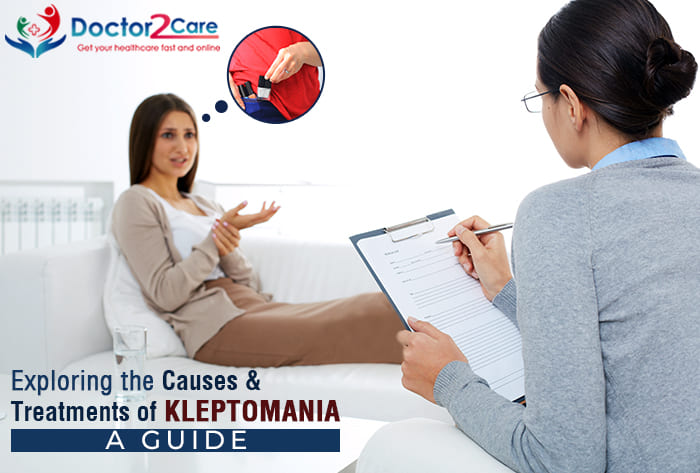Exploring the Causes and Treatments of Kleptomania: A Guide

There are many people who go through certain mental health issues from time to time and don't realise what is wrong with them . But a mental health concern turns into serious mental illness when ongoing signs and symptoms cause recurring stress and affect your ability to function normally.
A mental illness can make you feel miserable and lost. It can also cause major problems in your daily life.
One such mental health issue is Kleptomania that involves repeated urges to steal items that don't belong to you. Let's get into the blog to understand the disorder better and one can treat it. Also, if you or anyone you know is suffering from the same, feel no shame to book an online doctor consultation in India from Doctor2Care.
What is Kleptomania?
Kleptomania is a mental health disorder where a person feels an overwhelming, irresistible urge to steal things. People who have this disorder know that stealing is wrong and it can incur legal implications but they still can’t stop themselves from doing it.
This is a serious medical condition where a person doesn’t have the ability to resist the impulse to steal. It’s common for people with kleptomania to feel guilt, shame or stress about stealing. Many even try to compensate for this by returning items, donating them to charity, gifting the victims or going back and paying for the items after the fact.
People with Kleptomania can possibly steal small to big, cheap to expensive things.

Symptoms of the Mental Disorder
The symptoms of kleptomania are simple. The main symptom of it is that a person acts crazy on their irresistible urge or need to steal items or objects that are unnecessary. Let us see other symptoms:
- The items aren’t stolen out of necessity or for their value. They are stolen just because the person cannot control picking it up.
- A person may feel tension or anticipation before or while stealing, followed by pleasure, relief or other positive emotions immediately afterward.
- Some people throw stolen things away, give them to others or donate them to charity out of the post stealing guilt. Less commonly, a person will hoard stolen items, secretly return them or return and pay for them.
- Stealing is not preplanned and a person with kleptomania does it completely alone.Most people who are married with kleptomania keep it a secret from their spouse.
What causes Kleptomania?
It is not clear on why Kleptomania happens but there could be some possible points that are stated below:
- Differences in the structure of the brain:
People suffering from kleptomania are more likely to have certain differences in the structure of their brain's functionality. Especially in areas that manage impulse control and hindrances. These differences might indicate weaker or fewer connections in their brain areas that control the inhibition.
- Differences in the chemistry of the brain:
Your brain uses specialised chemicals known as neurotransmitters to communicate and manage certain activities. There are cases where people have developed kleptomania after they began taking medications that affect neurotransmitters in their brain’s neurotransmitters.
- Could be a symptom of other mental health conditions:
Some experts say that kleptomania could be a symptom and not a condition. It’s extremely common for people with kleptomania to have other mental health issues as well such as anxiety, depression, eating disorders, addictions and substance use disorders.

Treatment and Cure
There’s no standard procedure to cure and treat kleptomania, and there’s limited research on which treatment works the best. If anyone seeks treatment, the diagnosis is done by physical examination and psychological evaluation.
The most likely treatments fall into two major categories, stated below:
- Medication: Blocking the effects of opioid medications which are one of the first-line treatment options. There’s research keeping up with their effectiveness. These medications block the positive emotions a person feels when stealing, which could help a person resist the urge to steal.
- Psychotherapy: Psychotherapy also known as mental health therapy, talking or behavioural therapy, usually involves helping a person understand why they do certain things and then helping them develop ways to change or avoid those behaviours. Psychotherapy for kleptomania can take many forms, such as cognitive behavioural therapy (CBT), group therapy or even hypnosis.
Conclusion
Often the items that are stolen by the person suffering from the disorder have little to no value or he might not even require that or one could afford to buy them. Being a rare condition Kleptomania has no symptoms of crying but it can lead to depression or stress if the work of stealing is not successful, followed by a sense of guilt after doing it. Awareness of kleptomania, empathy toward those distressed , and rigorous research into treatment options are needed to reduce kleptomania's personal and societal costs. If you are suffering from the disorder or if anyone you know is going through then seek help via online doctor consultation in India.